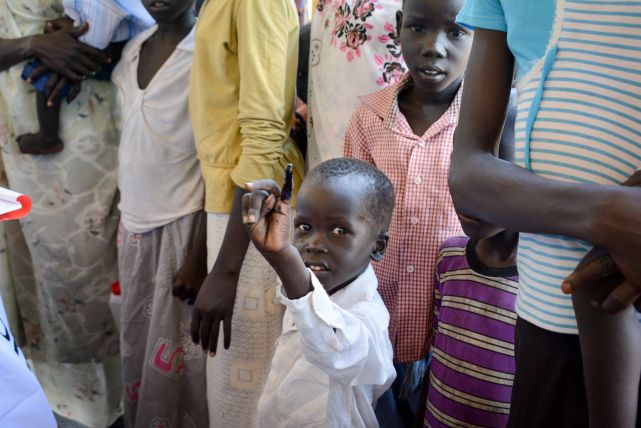World Refugee Day: "Millions Need Assistance"
Today is World Refugee Day - a day where we are reminded of the millions of refugees forced to flee from violence and conflict. James East, Emergency Communications Director, shares his reflection from his recent trip to South Sudan.
By James East, World Vision Emergency Communications Director
"My boy experienced all the benefits of living in a developed nation. He was taken to a nearby hospital in a car. He was promptly seen by a doctor at an inconvenient time. He has the medicines he needs. He can rest up in a nice house with a clean bed. Hopefully, he’ll be back at school in the next couple of days. But many thousands of displaced children have none of that. When children fall ill in South Sudan often the only thing left for mum and dad to do, is pray.
Last night I took my five-year-old son to hospital. He was ill with diarrhea, hadn’t eaten in two days and couldn’t keep anything down. He was barely stirring, the medicine didn’t seem to be working and he said he thought he might collapse.
I had only arrived back from South Sudan the day before and as my wife and I drove him to hospital I couldn’t help thinking about the mums in that country trying to keep their own children healthy at this time.
The differences between their situation and mine could not have been starker. Even though I was worried, I knew I my son would get great care and was not in any real danger.
The mothers who I had met in South Sudan just a few days earlier had fled fighting in their villages and towns and were now living in extremely basic conditions. They had literally escaped with nothing but the clothes on their backs.
Thousands of men, women and children had walked for days through the bush to find refuge from the armed men who had burned and looted their homes.
Elders told me of children who had died along the way from hunger and thirst. Mums told me about the struggle to drag their babies, toddlers and young ones to a place of safety through the dry badlands of the Upper Nile.
In the camps, settlements and villages where they have now found temporary refuge the situation facing their children is very difficult. There is not enough food to eat, the water they drink comes from the River Nile and is polluted with human and animal waste. The children suffer from stomach problems and diarrhea and are prone to catching malaria because they are living in very basic shelters without nets. The arrival of the rainy season has led to a proliferation of mosquitoes. In parts of the country cholera has been infecting hundreds.
Mums told me about having to cook tree leaves and having to beg food from others in order to scrape a meal together for their children. The children told me of feeling hungry and listless. At one food distribution point the teenage girl I was talking to felt faint from a lack of food, and she still had to drag the sack of sorghum back to her shelter with her grandma.
With such poor diets the children easily succumb to illness. Repeated bouts of diarrhea weaken young bodies and their immune systems begin to fail. They become prone to upper respiratory infections.
The worst of it all for a parent is the complete sense of powerlessness. Mothers hear their children asking for food but they can’t find enough to feed them. They watch their children’s health fail but they can’t find or afford the medicines they need. There are no options.
Aid agencies are scaling up their responses, providing minimum rations of food to huge numbers, and medical aid to the worst off and most malnourished. But millions need assistance.
My boy experienced all the benefits of living in a developed nation. He was taken to a nearby hospital in a car. He was promptly seen by a doctor at an inconvenient time. He has the medicines he needs. He can rest up in a nice house with a clean bed. Hopefully, he’ll be back at school in the next couple of days.
But many thousands of displaced children have none of that. When children fall ill in South Sudan often the only thing left for mum and dad to do, is pray."
World Vision is scaling up efforts in remote and volatile regions of South Sudan. From distributing food to prevent starvation and worsening malnutrition levels, distributing aid goods to providing a protective learning and play environment to children and sports activities, we remember the thousands of South Sudanese refugees fleeing from violence and needing our help.
